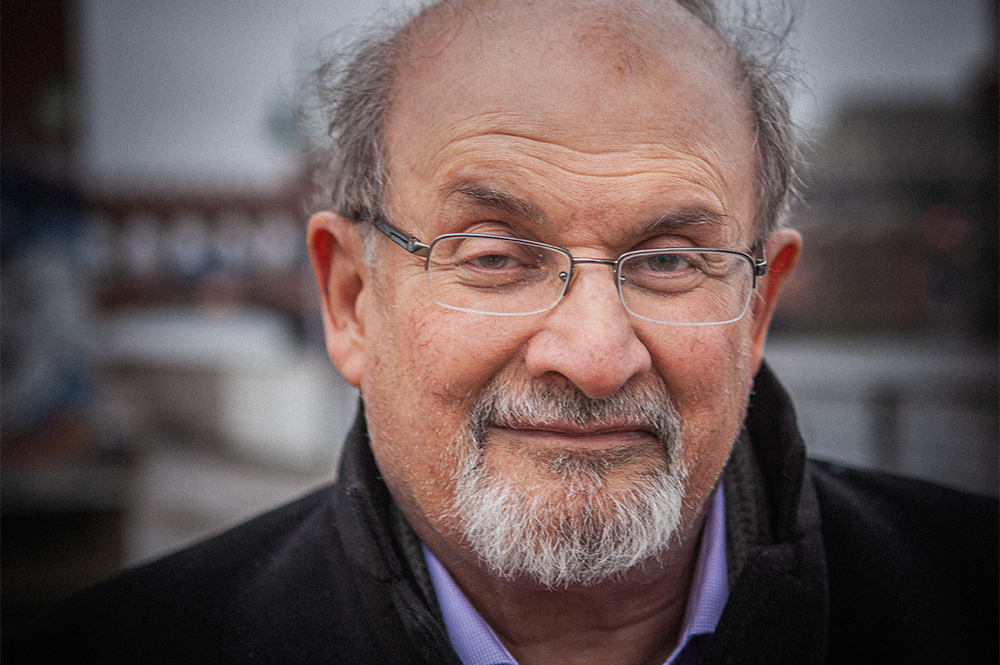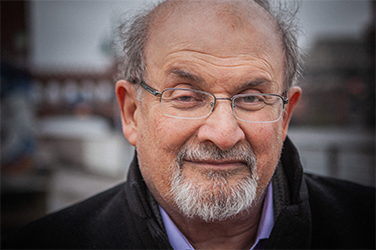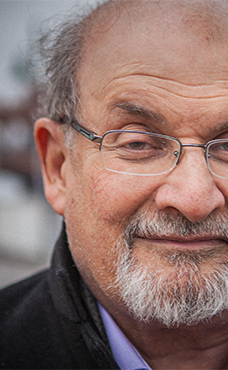
- Free Article: No
- Contents Category: Commentary
- Custom Article Title: Salman’s throat: Living with cancer and a fatwa
- Review Article: Yes
- Article Title: Salman’s throat
- Article Subtitle: Living with cancer and a fatwa
- Online Only: No
- Custom Highlight Text:
Restricted to phone consultations due to the Covid lockdown and my chemo-blasted immune system, I rely increasingly on the selfies of body parts that patients text me to help diagnosis. My iPhone library of lumps, bruises, wounds, rashes, boils, red eyes, and even vaginal discharges, grows rapidly, a luminous pathology museum that often reminds me of Dr Azov in Salman Rushdie’s Midnight’s Children (1981), who examines his future wife through a hole in a sheet and, over the course of many house calls, assembles a jigsaw picture of the complete woman with whom he will slowly fall in love.
- Article Hero Image (920px wide):

- Article Hero Image Caption: Salman Rushdie, 2019 (Christoph Kockelmann via Wikimedia Commons)
- Alt Tag (Article Hero Image): Salman Rushdie, 2019 (Christoph Kockelmann via Wikimedia Commons)
- Featured Image (400px * 250px):

- Alt Tag (Featured Image): 'Salman’s throat: Living with cancer and a fatwa' by Peter Goldsworthy
I read Joseph Anton (2012), Rushdie’s memoir of his years in hiding, during lockdown, wondering if there might be some lessons to be learned. Not so much for me – after a year of living chemotherapeutically, and months of forced medical detention, I feel like a world authority on quarantine – but for everyone else.
Not that I believe for one moment that our predicaments are comparable: Rushdie was under protective custody for years, in constant danger of being assassinated whenever he ventured out; my assassin, cancer, is seemingly at bay; when it returns, I will see it coming from a long way off. But the Covid stakes are high, uncertainly high, a viral jihad, with the death rate climbing.
A small personal surprise as I read Rushdie’s defence of The Satanic Verses (1988) in his memoir: I hadn’t taken much notice when I first read the novel decades ago that the character Changez is suffering from myeloma, now my illness. The Satanic Verses was the most famous book in the world for a long time, if for all the wrong reasons. Was it Chekhov who said that abuse is the sister of advertisement? Almost everyone at least flipped through the book in the years that followed the fatwa in 1989 – except, clearly, the Ayatollah Khomeini, the murderous tyrant of Iran. He had no idea about it at all. His malevolent stupidity, and the calculated fatwa, added millions to the book’s sales, although this wasn’t much consolation to Rushdie in the terrible years of isolation that followed – or to those murdered by association.
I read this part of Joseph Anton with personal investment. Changez is a fictionalised version of Rushdie’s father, who also died of myeloma, despite being on palliative mustard gas (aka melphalan, still the first up drug of choice for a stem cell transplant) up to the end. The passages about his father are both difficult and moving.
I had the good fortune to meet Rushdie, briefly, at the 1984 Adelaide Writers’ Week, chaired his session, and even peered down his throat with a torch and tongue depressor, at a time when the only thing he had to worry about in the world was tonsillitis. A few years later he might as well have had cancer; he was under a death sentence. One darkly humorous story from his book: at the funeral of his friend Bruce Chatwin, a few days after the fatwa was announced, another friend, the novelist Paul Theroux, sitting in the pew behind him, leant forward and murmured: ‘I suppose we’ll be back here next week for yours, Salman.’
Funny at the time, but not for many long years afterwards. The cancer of that fatwa, and the cancer of radical Islam – contra Susan Sontag, the metaphor seems appropriate for this malignancy – was spreading and multiplying at a fast rate. Metastasising, in a word. It still is, which is why Joseph Anton remains a crucial read for our times – a lens through which events can be seen more clearly. At times the book feels too long, overburdened with side-detail, and even a little self-indulgent, but that might just be my mustard-gassed attention span. Rushdie has surely earned our infinite indulgence by dint of his courage under fire, and the exemplary courage of those who stood by him. Of course, there are passages of despair, of betrayal by so-called friends, and of the expected cowardice of governments – but the book is a testament to Rushdie’s stoic resilience, black humour, and the loyalty of true friends, of whom he has many.
There are plenty of lessons for me, after all. And for a world under the fatwa of Covid? At the very least, it’s a lesson in the relativity of hardship, a 600-page reminder of one key mantra of stoicism: What have I got to complain about? There are others worse off than me.
This is an edited extract from Peter Goldsworthy’s coming book The Cancer Finishing School.



Comments powered by CComment